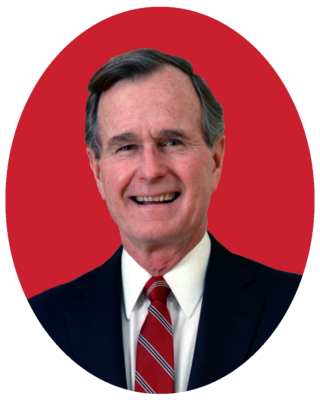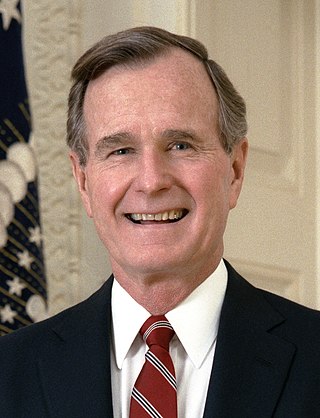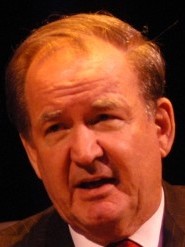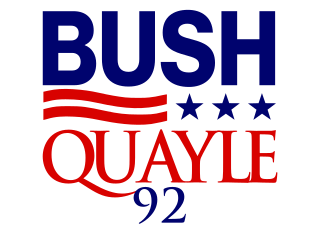The Opposition Research Group (ORG) refers to the division within the Republican National Committee formed in 1984 with its own budget of $1.1 million, to create a master data bank of computerized voter research and opposition research. ORG staff amassed data on eight Democratic presidential candidates, sourced from voting records, Congressional Record speeches, media clippings and transcripts, and campaign materials. In this way, the RNC was able to track inconsistencies of its opponents for use in political campaigns. This data base evolved into a network that linked information gleaned by Republicans in all 50 states, creating a master data base accessible to high-ranking Republican staff, even aboard Air Force One when Ronald Reagan was president. [1]
In the 1992 presidential election, independent candidate Ross Perot repeatedly accused the Republicans of "dirty tricks" and spying on him, but Republicans dismissed Perot's accusations as a "paranoid fantasy." David Tell, who headed ORG at the time said, "Mr. Perot is suggesting we are sitting here in the middle of this great spider web, calling newspaper reporters and planting these things, and that is baloney." [2]

The Natural Law Party (NLP) is a political party in Michigan. It was a national political party in the United States affiliated with the international Natural Law Party. It was founded in 1992. Beginning in 2004, many of its state chapters dissolved. The party's Michigan chapter is still active as of 2022.

The 1996 United States presidential election was the 53rd quadrennial presidential election, held on Tuesday, November 5, 1996. Incumbent Democratic President Bill Clinton defeated former Senate Majority Leader Bob Dole, the Republican nominee, and Ross Perot, the Reform Party nominee and 1992 Independent presidential candidate.

The 1992 United States presidential election was the 52nd quadrennial presidential election, held on Tuesday, November 3, 1992. Democratic Governor Bill Clinton of Arkansas defeated incumbent Republican President George H. W. Bush and independent businessman Ross Perot of Texas. The election marked the end of a period of Republican dominance in American presidential politics that began in 1968,, and also marked the end of 12 years of Republican rule of the White House, as well as the end of the Greatest Generation's 32-year American rule and the beginning of the baby boomers' 28-year dominance until 2020. It was the last time the incumbent president failed to win a second term until Donald Trump in 2020.

Henry Ross Perot Sr. was an American business magnate, politician, and philanthropist. He was the founder and chief executive officer of Electronic Data Systems and Perot Systems. He ran an independent campaign in the 1992 U.S. presidential election and a third-party campaign in the 1996 U.S. presidential election as the nominee of the Reform Party, which was formed by grassroots supporters of Perot's 1992 campaign. Although he failed to carry a single state in either election, both campaigns were the second and third strongest presidential showings by a third party or independent candidate in U.S. history.

The Reform Party of the United States of America (RPUSA), generally known as the Reform Party USA or the Reform Party, is a centrist political party in the United States, founded in 1995 by Ross Perot.
Third party is a term used in the United States for political parties other than the two major parties.

The 1992 Republican National Convention was held in the Astrodome in Houston, Texas, from August 17 to August 20, 1992. The convention nominated President George H. W. Bush and Vice President Dan Quayle for reelection. It was Bush's fourth consecutive appearance as a candidate on a major party ticket; only Bush and Franklin D. Roosevelt have been nominated on four consecutive presidential tickets. Richard Nixon and Roosevelt were nominated five times, but not consecutively.
In politics, opposition research is the practice of collecting information on a political opponent or other adversary that can be used to discredit or otherwise weaken them. The information can include biographical, legal, criminal, medical, educational, or financial history or activities, as well as prior media coverage, or the voting record of a politician. Opposition research can also entail using "trackers" to follow an individual and record their activities or political speeches.

The 1992 presidential campaign of Bill Clinton, the then-governor of Arkansas, was announced on October 3, 1991, at the Old State House in Little Rock, Arkansas. After winning a majority of delegates in the Democratic primaries of 1992, the campaign announced that then-junior U.S. senator from Tennessee, Al Gore, would be Clinton's running mate. The Clinton–Gore ticket defeated Republican incumbent President George H. W. Bush and Vice President Dan Quayle in the presidential election on November 3, 1992, and took office as the 42nd president and 45th vice president, respectively, on January 20, 1993.

The 1992 Democratic National Convention nominated Governor Bill Clinton of Arkansas for president and Senator Al Gore from Tennessee for vice president; Clinton announced Gore as his running-mate on July 9, 1992. The convention was held at Madison Square Garden in New York City, New York from July 13 to July 16, 1992. The Clinton-Gore ticket then faced and defeated their Republican opponents, President George H. W. Bush and Vice President Dan Quayle as well as the independent ticket of Ross Perot and James Stockdale in the 1992 presidential election.

The Commission on Presidential Debates (CPD) is a nonprofit corporation established in 1987 under the joint sponsorship of the Democratic and Republican political parties in the United States. The CPD sponsors and produces debates for U.S. presidential and vice-presidential candidates and undertakes research and educational activities relating to the debates. It has run all of the presidential debates held since 1988. The commission's debates are sponsored by private contributions from foundations and corporations as well as fees from hosting institutions.
United We Stand America was the name selected by Texas businessman H. Ross Perot for his citizen action organization after his 1992 independent political campaign for President of the United States. Perot's 19% showing in the 1992 election was sufficient to entitle him to federal matching funds for the 1996 campaign. After the campaign, Perot announced, on January 11, 1993, the formation of a non-profit watchdog organization named United We Stand America.

Presidential primaries and caucuses of the Republican Party took place within all 50 U.S. states and the District of Columbia between February 18 to June 9, 1992. These elections were designed to select the 2,277 delegates to send to the national convention in Houston, Texas from August 17 to August 20, 1992, who selected the Republican Party's nominee for president in the 1992 United States presidential election, incumbent president George H. W. Bush. The delegates also approved the party platform and vice-presidential nominee. Bush went on to lose the general election to the Democratic nominee, Governor Bill Clinton.

In 1992, Ross Perot ran unsuccessfully as an independent candidate for President of the United States. Perot was a Texas industrialist who had never served as a public official, but he had experience as the head of several successful corporations and had been involved in public affairs for the previous three decades. Grass-root organizations sprang up in every state to help Perot achieve ballot access following his announcement on the February 20, 1992, edition of Larry King Live. James Stockdale, a retired Navy vice admiral, was Perot's running mate.

Following Ross Perot's impressive showing during the 1996 presidential election, the Reform Party of the United States of America became the country's largest third party. The party's 2000 presidential candidate would be entitled to $12.5 million in matching funds. Several high-profile candidates vied for the nomination, including Donald Trump, Pat Buchanan, and physicist John Hagelin. For a brief time, Congressman John B. Anderson and Congressman Ron Paul were considered potential candidates, but both ultimately declined to seek the nomination.

The 1992 United States elections elected state governors, the President of the United States, and members of the 103rd United States Congress. The election took place after the Soviet Union crumbled and the Cold War ended, as well as the redistricting that resulted from the 1990 census. Often considered "The Year Of The Woman," these elections brought an increased number of female politicians to Washington such as Dianne Feinstein (D-CA) and Carol Moseley Braun (D-IL). Governor Bill Clinton of Arkansas defeated incumbent President George H. W. Bush and businessman Ross Perot in the presidential election. The Democratic Party maintained their control of both chambers of Congress. This is the first Democratic trifecta since the Republican victory in the 1980 elections and the last one during the 20th century and the last one overall until 2008.

The 1993 New Jersey gubernatorial election was held on November 2, 1993. Incumbent Democratic Governor James Florio was narrowly defeated by Republican former Somerset County freeholder and 1990 U.S. Senate nominee Christine Todd Whitman. Primary elections were held on June 8, 1993. In the Democratic primary, Governor Florio's only challenger, anti-tax activist John Budzash, was disqualified from the ballot due to invalid petition signatures. In the Republican primary, Whitman defeated W. Cary Edwards and James Wallwork.
The United States presidential election debates were held during the 1996 presidential election. Two debates were held between Republican candidate, Senate Majority Leader Bob Dole and Democratic incumbent President Bill Clinton, the major candidates. One debate was held with their vice presidential running mates, Jack Kemp and Al Gore. All three debates were sponsored by the non-profit Commission on Presidential Debates (CPD), which has organized presidential debates since its establishment in 1987.
The 1992 United States presidential debates were a series of debates held for the presidential election.

The 1992 presidential campaign of George H. W. Bush was an unsuccessful re-election campaign for 1992 United States presidential election by incumbent president George H. W. Bush, who had taken office on January 20, 1989. The primary reason that Bush lost to Clinton was the independent candidacy of Ross Perot. Bush and incumbent vice president Dan Quayle were defeated by Democratic presidential nominee Bill Clinton and vice presidential nominee Al Gore. Bush, a Republican president and former vice president under Ronald Reagan, launched his presidential bid on October 11, 1991 and secured nomination for his re-election on August 20, 1992. He was challenged in the Republican primaries by former White House Communications Director Pat Buchanan, who received less than one percent of the delegates in the Convention.